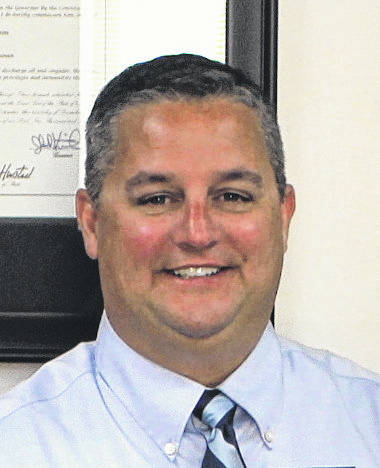
Nine Department of Justice grant officials gathered in a DOJ office room in Washington Monday with Highland County Commissioner Shane Wilkin and county clerk Nicole Oberrecht to revisit the stalled federal grant for Rocky Fork Lake, with Wilkin emerging from the 90-minute meeting feeling “more optimistic than I did a week ago.”
The high level of attention from DOJ officials was in stark contrast to local officials trying for months to have a conversation with grant officials over a hold that was placed on the $844,000 grant mere months after the award was announced in October 2016.
“I think the people in the room have a little better understanding of the challenges we face in rural areas,” said Wilkin. He said federal officials offered additional assistance in implementing the grant.
The county will submit an amended budget by the end of March with changes discussed Monday. Although the grant cycle is set to end this October, Wilkin said his discussion on Monday left him optimistic that an extension will be granted.
“They encouraged us when resubmitting a budget to apply for an extension at the same time,” said Wilkin, adding that he also left the meeting with renewed hope that the land bank component of the project will be approved, albeit with changes in scope to satisfy federal officials.
Wilkin said the DOJ officials also promised to provide samples of policies and procedures from other projects “to see what fits us.”
Although DOJ officials reiterated that a portion of the grant funds – about $60,000 for a deputy dedicated to lake patrol – remain available for use, Wilkin said he told them he wasn’t comfortable spending those funds until the entire budget is approved.
“I’d rather be safe than sorry,” said Wilkin.
Overall, Wilkin said the federal officials seemed intent on making the project work.
“They were very clear they do want to help us get everything rectified and move forward addressing crime at Rocky Fork Lake,” said Wilkin.
Wilkin said it is unlikely that LuAnn Winkle, the former director of Turning Point Applied Learning Center, will return as site coordinator, since she has retired. He said a county employee or contract coordinator reporting directly to commissioners will likely fill that position.
The meeting was originally scheduled for 10 a.m. Monday, but Oberrecht’s flight was delayed by mechanical issues. DOJ officials agreed to reschedule the meeting for 3:30 p.m.
“Overall, it went pretty well,” said Wilkin.
Officials with the DOJ’s Office of Justice Programs told The Times-Gazette earlier this month that the holdup of the grant is due to concerns that “key grants management responsibilities were being administered by a sub-recipient,” and “the grantee did not have adequate internal controls in place to ensure funds were to be expended in accordance with the terms and conditions of the award.”
The “sub-recipient” of the grant was Turning Point. Winkle was the driving force behind winning the grant and was also set to be the site coordinator, although the grant was technically applied for by the Highland County Commissioners.
Winkle and Wilkin both said earlier this month that a major part of the problem with the grant had been constant changes in requirements, endless requests for more documentation, and, as other officials described it, “moving the goalposts” in ways that small counties like Highland cannot adjust due to small staffing.
For several months, Wilkin had been frustrated in attempting to get answers, saying in late January that he had offered “to fly out (to Washington) for a face to face.” He said he wanted to ask, “What happened here? Why did this happen?”
The agreement by DOJ officials to meet with Wilkin came on the heels of Times-Gazette articles in late February detailing the difficulties that elected officials and the newspaper had experienced in getting answers from the Bureau of Justice Assistance, which is the umbrella agency over the Byrne Criminal Justice Innovation Program, which awarded the grant to Highland County.
The Times-Gazette’s stories included expressions of frustration from U.S. Rep. Brad Wenstrup (R-2nd Dist.) and U.S. Sen. Rob Portman (R-Ohio).
A public affairs specialist with the Office of Justice Programs, James Goodwin, provided an emailed response March 2 to questions posed by The Times-Gazette, stating, “In April 2017, a withholding of funds was placed on the grant as a result of the Bureau of Justice Assistance grant manager’s discovery that key grants management responsibilities were being administered by a sub-recipient… The grantee did not have adequate internal controls in place to ensure funds were to be expended in accordance with the terms and conditions of the award. BJA notified Highland County of these issues and determinations in writing.”
Winkle and Wilkin both reiterated previously that the original grant proposals made clear Turning Point’s role in the grant. Winkle said federal agencies don’t understand small counties like Highland when they express concerns about a lack of “internal controls.” Winkle has won and administered numerous federal grants over the years in her role at Turning Point.
“I’ve never had any problems in the past,” said Winkle.
On Monday, Wilkin said the subject of why the issues that caused the grant to be frozen were identified so late in the process was only briefly mentioned, with everyone agreeing to move forward rather than focus on the past.
Reach Gary Abernathy at 937-393-3456 or follow on Twitter @AbernathyGary.


